Menendez Investigation Is Said to Involve Questions About Luxury Gifts ... The Dumbest Details From the Menendez Indictment ... Israel's opposition calls for Ben-Gvir's firing after daylight murder


Senator Robert Menendez, Democrat of New Jersey, has said he is confident the inquiry will “end up in absolutely nothing.”
After nearly a year of anticipation, the most shocking thing about the federal indictment of Sen. Robert Menendez that dropped Friday is how clumsy it makes the senator and his co-conspirators look.
According to the indictment, the Democrat, his wife, and their alleged accomplices left fingerprints—literal, digital, and figurative—all over the purported plot to take bribes in exchange for local, national, and international favors. So far, Menendez and two of the other defendants have denied wrongdoing.
None has yet disputed U.S. Attorney Damian Williams’ evidence. And that evidence, if accurate, would appear to indicate that not only is Menendez a crook, but an incredibly bad one.
Here’s a rundown of the most ridiculous tidbits from the criminal complaint.
The envelopes
Envelopes are all over Williams’ indictment, just like they were allegedly all over Menendez’s home when the FBI paid a visit last summer. Among other locales, the feds reported finding them inside the pockets of two jackets with the senator’s name stitched on them—one appearing to be a Congressional Hispanic Caucus windbreaker.
On the envelopes themselves, the feds say they found the fingerprints and DNA of alleged co-conspirator Fred Daibes and his chauffeur—and, on one, Daibes’ return address.
The total value of the cash on the premises came to almost $500,000. And that’s without getting into the allegedly gifted Mercedes convertible in the garage, or…
The gold bars
The FBI also reported recovering more than $100,000 in gold bars of different sizes from the Menendez residence. The thing about gold bars is that they come with unique serial numbers, and the indictment asserts these numbers let them trace 11 of the bars at the home to Daibes, and two more to Wael Hana, the Egyptian-American businessman behind the mysterious exporter IS EG Halal.

Damian Williams, U.S. Attorney for the Southern District of New York, announcing that U.S. Sen. Robert Menendez (D-NJ) was indicted on corruption charges charges.
The Google searches
It’s unclear whether the feds got the info from Menendez’s internet service provider, or whether he just didn’t clear his browser history, but shortly after receiving one of the alleged deliveries of gold bars, the indictment claims the senator Googled “kilo of gold price.”
It’s not the only time he allegedly left a trail online. Elsewhere, the complaint claims Menendez did a Google search for the state agency whose investigation of an employee and relative of co-defendant Jose Uribe he allegedly attempted to interfere in.
The photos
Maybe it’s too much in this era to suggest somebody not pictorially document every waking moment of their life. But you might want to at least crop some of your shots.
The Menendez couple, Uribe, and an associate let somebody photograph the four of them at a “celebratory dinner” shortly after the senator interceded to resolve some of Uribe’s legal issues.
The married pair also had their photo taken during a private dinner at the home of an Egyptian intelligence official allegedly in on one of the bribery schemes, while the feds said they found a picture of two gold bars on the senatorial spouse’s phone—with the serial numbers linking them to Daibes plainly visible.

Senator Bob Menendez (D-NJ) and his wife Nadine Arslanian.
The text messages
The only thing more irritating than a partner who texts absolutely constantly is one who can’t stop texting about a criminal conspiracy you’re implicated in—creating a mass of evidence for investigators to grab.
But that’s allegedly exactly what the senator’s wife did. And despite her alleged efforts to delete the texts, the Justice Department recovered some doozies. For instance, on one occasion, she allegedly texted Daibes to complain Hana hadn’t paid her, prompting the businessman to respond “Nadine I personally gave Bob a check for September.”
While awaiting that payment from Hana, she messaged her husband “I am soooooo upset,” and added “I thought Fred [DAIBES] would make sure it’s there and the second day in a row there is nothing.” She did eventually get $30,000 from IS EG Halal, the indictment notes.
Nadine Menendez did not keep her texting to her fellow Americans either. She allegedly wrote the Egyptian intelligence official “anytime you need anything you have my number and we will make everything happen.”
She also left a text message record of Uribe’s alleged underwriting of her Mercedes, sending Hana “I’m so excited to get a car next week. !!” and writing to her husband “Congratulations mon amour de la vie, we are the proud owners of a 2019 Mercedes.” Uribe wrote her “are you happy,” to which she responded “I will never forget this.”
And on multiple occasions, she responded to Daibes’ alleged bribes with “Christmas in January” and “THANK YOU Fred” with a string of emojis. She also texted to tell the businessman, facing bank fraud charges, that her husband was sleeping better due to Daibes’ trial date getting temporarily adjourned—after the senator purportedly intervened repeatedly with the Justice Department on his behalf.
“He was amazing in all he did. He’s an amazing friend and as loyal as they come,” Daibes responded. “Let me know if I can get him a recliner. It helped me sleep.”
Of course, the senator himself appears to have implicated himself by texting government information to his partner—once about an impending ammunition sale—that she then forwarded to Hana, who passed it along to his Egyptian government contacts. According to the indictment, in response to the ammo news, a Cairo military official “replied with a ‘thumbs-up’ emoji.”
Then there’s the occasion detailed in the indictment when the senator sent his bride a news article about his colleagues’ intention to raise the Middle Eastern autocracy’s abysmal human rights, which she promptly passed to yet another Egyptian official. That anonymous operative responded, “Thanks you so much, chairman [Menendez] also raised it today, we appreciate it.”
“I just thought it would be better to know ahead of time what is being talked about and this way you can prepare your rebuttals,” she allegedly wrote back.
The opposition railed against National Security Minister Itamar Ben-Gvir on Wednesday after six people were killed in Arab-sector crime incidents, five in the northern Bedouin town Basmat Tabun, and a sixth man, Ataf Abu Kalib, 50, was shot dead in broad daylight in Haifa.
In Basmat Tabun, the victims were all members of the same Delaika family: the parents and their three children. Police suspect a connection between the two murders and are investigating.
Magen David Adom paramedics who arrived at Basmat Tabun pronounced their deaths, while evacuating another man at the scene with moderate injuries to the Rambam Health Care Campus in Haifa. “A redline was crossed here,” said police chief Kobi Shabtai at the scene. “The people who carried out this attack, from our perspective, are terrorists; this is a terrorist act,” he added, vowing to bring the killers to justice.
Medics who arrived in Haifa found Abu Kalib lifeless. Three masked men, armed with automatic weapons, rained fire on him, killing him instantly, and immediately exited the scene. Abu Kalib is the cousin of Omar Abu Kalib, a member of the Hariri criminal group.
These latest victims bring the death tally in Arab sector violence this year to 188, compared to 80 at this point last year, according to the Abraham Initiatives, a nonprofit that deals with Arab-Israeli dialogue and tracks the murder rate in the sector. The organization pointed the responsibility to Prime Minister Benjamin Netanyahu, saying he must “fire the national security minister immediately and implement a welfare plan to deal with sector crime. This is an emergency.”
The Abraham Initiatives added that of the 188, 171 were shot, 87 were under the age of 30, and 12 were women.
Benny Gantz calls for Ben-Gvir to be fired
After the Haifa murder, various opposition members spoke out against Ben-Gvir with some calling for him to be fired.
Earlier in the day, after the Haifa murder, National Unity leader Benny Gantz said, “The murder today shows just how severe the neglect is and how widespread and deep the treatment must be. The current government, which appointed Ben-Gvir, who is busy with provocations instead of saving human life, is not qualified to handle this problem. The prime minister must fire Ben-Gvir not only because of his actions, but mainly because of his neglect.”Yesh Atid MK Ron Katz voiced a similar sentiment alongside a screenshot of footage from the murder.
Head of the Otzma Yehudit party MK Itamar Ben Gvir at a special committee in the Knesset, the Israeli parliament in Jerusalem, on December 18, 2022. (credit: YONATAN SINDEL/FLASH90)“This morning, a man was assassinated in the North,” he wrote. “And the idle minister is busy with interviews, TikTok videos, and planning prayer services to divide the people. In what other country would this minister be kept in his position? How can it be that there is no price for failure in the State of Israel?”
He ended by telling Netanyahu that he is responsible for the issue, an accusation echoed by National Unity MK Yifat Shasha-Biton.
“We cannot deal with Ben-Gvir with tweets, it’s time for action,” she said. “There’s no governance, there’s no security, there are more and more victims, more and more crime, and there’s no light at the end of the darkness that has befallen us. Israel’s citizens are living in fear on [Netanyahu’s] watch. You cannot blame the appointed minister, who suffers from delusions of grandeur and who is busy being the neighborhood bully. You were chosen to lead. The responsibility is on you. It’s time to do it.”
After the Basmat Tabun murders, Ben-Gvir made his way to the scene.
“I’m expressing deep shock from the violence and the bloodbath in the Arab sector that claimed another six lives today,” he said. “In the last few months, we gave the police a lot of resources and passed legislation that will help police to eradicate the murders, and we are continuing to work to pass laws, like the option of using biometric cameras, that could save lives.”
The last time a murder of this scale in the sector took place was three months ago in Yafia. Five people were shot in a shooting at a car wash. An investigation found that the shots were fired from automatic weapons.
A woman who resides in the regional council told Maariv that she was at home “when we heard police sirens on the street. We went out not understanding what was happening, and then we heard about the horrific murder of the Delaika family in their home. People cried and screamed. This situation cannot continue; we are being neglected every day. There is no knowing who will be the next victim.”
Robert Menendez, chairman of the US Senate Committee on Foreign Relations, recently warned opposition leader Benjamin Netanyahu that including extreme-right lawmakers in a potential future government would harm US-Israel relations, according to a report Saturday.
According to the Axios report, Menendez made the comments during a visit to Israel last month. Citing two unnamed American sources familiar with the meeting, the report said Menendez raised his concerns over Netanyahu’s cooperation with far-right parties, specifically mentioning Otzma Yehudit and its leader Itamar Ben Gvir.
Former prime minister Netanyahu recently brokered a deal to get Otzma Yehudit and Bezalel Smotrich’s Religious Zionism party to run together in a bid to improve his chances of returning to power.
Ben Gvir has reportedly been offered a senior ministerial position if a Netanyahu-led government is established.
Netanyahu said ahead of previous elections that he did not believe the extremist Ben Gvir was fit to be a minister. However, without Ben Gvir’s support, Netanyahu likely has little to no chance of leading the next government.
The report said Menendez told Netanyahu he had “serious concerns” about including “extremist and polarizing individuals like Ben Gvir” in a future government, citing the unnamed US sources.
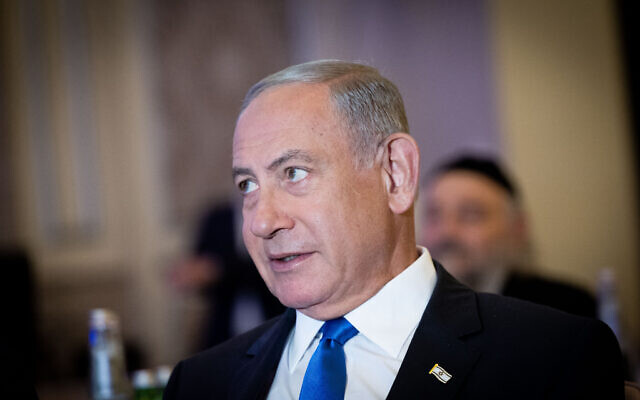
“The senator told Netanyahu he needed to realize the composition of such a coalition could seriously erode bipartisan support in Washington, which has been a pillar of the bilateral relationship between the US and Israel,” one of the sources cited by Axios said.
One of the sources said Netanyahu was “pissed off” by Menendez’s comments.

Netanyahu’s office declined to comment on the report, the news site said, and US State Department spokesman Ned Price said the Biden administration does not interfere in Israel’s internal politics.
Ben Gvir, meanwhile, responded by blaming Prime Minister Yair Lapid, who also serves as foreign minister, for “destroying” Israel’s foreign relations, accusing him of “dragging” Menendez into interfering in the Israeli election process.
Ben Gvir is an admirer of late extremist rabbi Meir Kahane, who advocated transferring Israel’s Arabs out of the country. He was convicted of incitement to racism in 2007 for holding a sign at a protest reading “Expel the Arab enemy.”

In recent public remarks, he has sought to downplay his extremist views, saying he isn’t in favor of expelling all Arabs — only terrorists or those he deems disloyal. However, analysts have pointed out that he regularly refers to many Arab public figures with no history of terror-related activities, including elected lawmakers and party leaders, as “terrorists.”
Until it began to harm him politically, Ben Gvir also kept on a wall of his Hebron home a picture of Baruch Goldstein, who in 1994 massacred 29 Palestinians at prayer in Hebron’s Tomb of the Patriarchs. During a recent visit to a high school in the central city of Ramat Gan, Ben Gvir said he no longer considers Goldstein a “hero.”
Ben Gvir frequently stirs up friction between Jewish and Arab Israelis and was reportedly accused by the national police chief of abetting the worst inter-communal violence in recent Israeli history in May of last year.
He has additionally allied with some of Israel’s most extremist Jewish movements and activists — including Lehava, a Jewish supremacist anti-miscegenation group, and the virulently homophobic Noam.

As The Times of Israel’s political correspondent, I spend my days in the Knesset trenches, speaking with politicians and advisers to understand their plans, goals and motivations.
I'm proud of our coverage of this government's plans to overhaul the judiciary, including the political and social discontent that underpins the proposed changes and the intense public backlash against the shakeup.
Your support through The Times of Israel Community helps us continue to keep readers across the world properly informed during this tumultuous time. Have you appreciated our coverage in past months? If so, please join the ToI Community today.
~ Carrie Keller-Lynn, Political Correspondent

We’re really pleased that you’ve read X Times of Israel articles in the past month.
That’s why we started the Times of Israel eleven years ago - to provide discerning readers like you with must-read coverage of Israel and the Jewish world.
So now we have a request. Unlike other news outlets, we haven’t put up a paywall. But as the journalism we do is costly, we invite readers for whom The Times of Israel has become important to help support our work by joining The Times of Israel Community.
For as little as $6 a month you can help support our quality journalism while enjoying The Times of Israel AD-FREE, as well as accessing exclusive content available only to Times of Israel Community members.
Thank you,
David Horovitz, Founding Editor of The Times of Israel
Far-right lawmaker Itamar Ben Gvir issues a statement responding to reports that Robert Menendez, chairman of the US Senate Committee on Foreign Relations, recently warned opposition leader Benjamin Netanyahu that including extreme-right lawmakers in a potential future government would harm US-Israel relations.
“I am deeply concerned by reports that Senator Menendez has aimed incorrect and mistaken criticisms at the millions of Israelis who will soon vote in favor of a center-right government and me personally,” Ben Gvir says in an English language statement.
According to a recent Axios report, Menendez made the comments during a visit to Israel last month. Citing two unnamed American sources familiar with the meeting, the report said Menendez raised his concerns over Netanyahu’s cooperation with far-right parties, specifically mentioning Otzma Yehudit and its leader Ben Gvir.
Ben Gvir is No. 2 on the Religious Zionism, slate, which is projected to win between 12 and 14 seats in the November 1 election, positioning himself to receive a senior cabinet posting if Netanyahu manages to form the kind of hard-right, religious coalition on which he has been campaigning.
“Everyone knows that the senator is a true friend of Israel and a champion of the US-Israel relationship, and more importantly, he is a man of integrity. Therefore, my sense is that he would not have made the statements reported had he been correctly informed of the positions I hold, as well as those I do not hold,” Ben Gvir says.
“The enemies of a strong Israel besmirch me; calling me and my party racist. But the truth is that we are anti-racist — we are fighting against the racist antisemitism fomenting within the boundaries of our homeland. We believe that Israel needs to uproot terror organizations such as Hamas, Islamic Jihad, and Al-Aqsa Martyrs’ Brigades, just as the United States defeated al-Qaeda,” Ben Gvir says.
“Like millions of Americans, we believe that peace comes through strength and that Israel’s policies should be based upon the firm enforcement of our right to sovereignty and self-defense,” he says, adding that he would work to ease soldiers’ rules of engagement and reform the justice system.

As The Times of Israel’s political correspondent, I spend my days in the Knesset trenches, speaking with politicians and advisers to understand their plans, goals and motivations.
I'm proud of our coverage of this government's plans to overhaul the judiciary, including the political and social discontent that underpins the proposed changes and the intense public backlash against the shakeup.
Your support through The Times of Israel Community helps us continue to keep readers across the world properly informed during this tumultuous time. Have you appreciated our coverage in past months? If so, please join the ToI Community today.
~ Carrie Keller-Lynn, Political Correspondent

We’re really pleased that you’ve read X Times of Israel articles in the past month.
That’s why we started the Times of Israel eleven years ago - to provide discerning readers like you with must-read coverage of Israel and the Jewish world.
So now we have a request. Unlike other news outlets, we haven’t put up a paywall. But as the journalism we do is costly, we invite readers for whom The Times of Israel has become important to help support our work by joining The Times of Israel Community.
For as little as $6 a month you can help support our quality journalism while enjoying The Times of Israel AD-FREE, as well as accessing exclusive content available only to Times of Israel Community members.
Thank you,
David Horovitz, Founding Editor of The Times of Israel
National Security Minister Itamar Ben-Gvir cancelled the prayer service he had planned for Thursday after being pressured to do so by his fellow coalition members.
In a statement released by the minister's office, the claim was that Ben-Gvir had changed his mind as a result of "an announcement by the far-left protest leaders saying they wouldn't repeat the antisemitic activity they led on Yom Kippur."
"I'm happy the extreme Left understood that there is no place for antisemitism against Jews in the heart of Tel Aviv," said Ben-Gvir. "We have one Jewish nation where Jews can pray in public spaces whenever and wherever they want."
Ben-Gvir had announced the service following the events of Yom Kippur in which protesters disrupted a Kol Nidrei prayer service in Dizengoff Square as the holiday began because the congregants set up a partition to divide men and women despite the Tel Aviv Municipality and the High Court of Justice banning it.
A counter-prayer on Thursday was announced by the Kaplan Force protest organization soon after Ben-Gvir's invitation for people to join his. The Kaplan Force's service was set for an hour-and-a-half after Ben-Gvir's and was supposed to take place in Dizengoff Square as well but was moved to Habima Square instead on Wednesday.
Jews pray while activists protest against gender segregation in the public space during a public prayer on Dizengoff Square in Tel Aviv, on Yom Kippur, the Day of Atonement, and the holiest of Jewish holidays, September 25, 2023. (credit: ITAI RON/FLASH90)"Ben-Gvir's provocation is staying in Dizengoff," the announcement said.
Protests groups celebrate the win
After Ben-Gvir announced that he was cancelling the service, protest groups took credit for the decision.
"What led the national danger minister to cancel his 'prayer' provocation in Dizengoff was the decision of the protest organizations to ignore it," they said. "Let this be a lesson to anyone who gives a stage to the public relations tricks of an incapable pyromaniac who only wants to divide people and make them hate each other."
The view that Ben-Gvir was creating a provocation by holding his prayer service was held throughout the coalition as well, with many urging Ben-Gvir to cancel his event or move the service to a synagogue in the area.
"I want it to be clear to everyone that Jews are allowed to pray anywhere in the world without disruptions," said Economy Minister Nir Barkat on Wednesday morning. "The truth is that [the Yom Kippur incident] broke my heart. I see the extremists in the State of Israel pulling us to the edges and ripping the extremely important social fabric that connects us.
"We need to work toward unity and love and work on our common denominators while not allowing extremists to lead us to the crumbling of our social fabric. Therefore, I call on Ben-Gvir as well not to provoke and not to go to Dizengoff. I call on everyone to focus on what connects us and not on the edges."
When asked if he would attend the prayer service, Innovation, Science, and Technology Minister Ofir Akunis said that Ben-Gvir would do better to move it to a synagogue so as to avoid a provocation in a public space.
Pressure to cancel the service had also come from the Religious Zionist Party with whom Ben-Gvir's Otzma Yehudit party had run in the last elections. RZP leader Finance Minister Bezalel Smotrich said on Tuesday that the event would be playing into the hands of the protest and that this wasn't the time for "unnecessary provocation."
Some reports indicated that Ben-Gvir had been met with pushback even within his own party.
The cancellation of the event, however, was praised by Tel Aviv Mayor Ron Huldai.
"I'm happy that sanity won out," he said. "In these days, there is no place for stoking the flames and hate among brothers. Tel Aviv will continue to respect the traditions and the religion alongside democratic values. The two together are an important basis for the State of Israel."
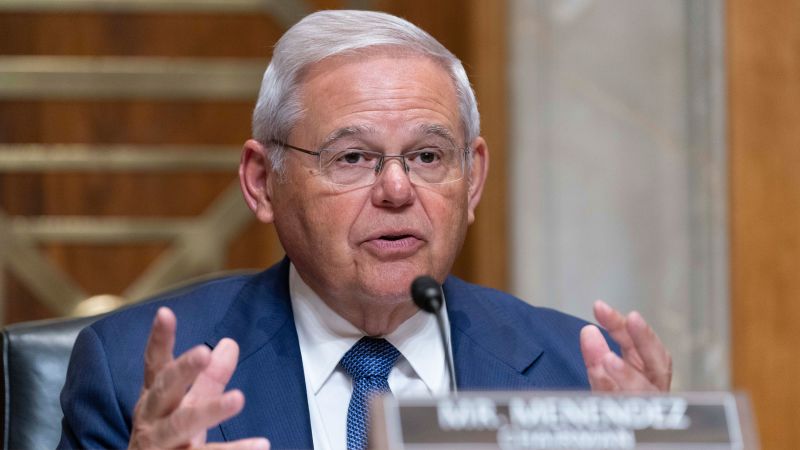
The indictment unveiled on Friday against Sen. Robert Menendez marks another chapter in a series of troubling allegations that have dogged the New Jersey Democrat for years, marking the second time in a decade that he has faced corruption charges. The question the indictment leaves unanswered is, did the Egyptian government target an influential United States senator to do its bidding on Capitol Hill?
Menendez and his wife, Nadine, are charged along with three businessmen in a complicated plot to accept hundreds of thousands of dollars in bribes including cash, gold bars, a Mercedes convertible, even mortgage payments. According to the indictment, Menendez accepted these payoffs in return for using his position as a United States senator and chairman of the Senate Foreign Relations Committee because he agreed to use “his influence and power and breach his official duty in ways that benefited the Government of Egypt.”
It is alleged that Menendez used his political position to attempt to break a State Department “hold” on US aid to Egypt, push for the delivery of ammunition and weapons systems to the Egyptian military, and passed sensitive information about American and Egyptian personnel assigned to the US Embassy in Cairo. It should be noted that some of these actions are things that the senator could have done legally if they were not allegedly in return for cash and gold.
“The excesses of these prosecutors is apparent,” Menendez said in a statement on Friday. “They have misrepresented the normal work of a Congressional office. On top of that, not content with making false claims against me, they have attacked my wife for the longstanding friendships she had before she and I even met.”
The Egyptian government has not commented on the indictment and Menendez and his wife, as well as the others charged, have strongly denied the charges.
Following a mistrial on previous corruption charges in 2017, Menendez was acquitted on several charges in 2018 with the Department of Justice dropping those that remained.
On the latest allegations, as someone who worked at the FBI, in the Office of the Director of National Intelligence, and the New York Police Department’s Intelligence Bureau, I am struck by the elephant that seems to be missing from the room: Nothing in the indictment describes what investigators know, if anything, about the role of Egyptian officials and whether they had direction or knowledge over the bribery scheme. Why is this important? Because the possible subtext of this story is that Cairo may have used agents in the US to try and recruit the top elected legislative official with influence over foreign policy to be its puppet. Yes, when you say it out loud it is shocking.
The use of foreign nationals, expats, dual citizens, or even Americans, who have a loyalty to a foreign country is a proven tactic in the spy game. Does Egypt, a country that has received billions in US aid, conduct sophisticated intelligence operations on US soil?
Another recent case suggests they might. In January of 2022, Pierre Girgis, an Egyptian-American banker, based in New York was charged by federal prosecutors who say he “acted in the United States as an agent of the Arab Republic of Egypt.” The indictment charged that Girgis “operated at the direction and control of multiple employees of the Egyptian government in an effort to further in the United States the interests of the Egyptian Government.” It alleged that Girgis cultivated close relationships with members of US law enforcement including members of the NYPD in an effort to gather information on opponents of Egyptian President Abdel Fattah el-Sisi in the United States.
After the indictment was unsealed, Girgis pleaded not guilty and was released on his own recognizance. The case is awaiting trial.
The Egyptian government has been known to arrest, imprison, even torture those it considers enemies of the regime. Indeed, the very reason the US State Department had put holds on some aid to Egypt, the same holds Menendez was asked to break, was to press Egypt on human rights reforms relating to crackdowns on dissent. While Girgis has been charged with being an unregistered agent of Egypt, Wael Hana, the businessman charged with bribing Menendez to advance Egyptian interests, has not. Hana and two other businessmen are charged with bribery.
Wael Hana, who has pleaded not guilty, is described in the indictment as being “originally from Egypt” and having “maintained close connections with Egyptian officials.” It was Hana, investigators say, who was friends with Nadine Arslanian “for many years before she began dating Robert Menendez,” whom she eventually married. The indictment charges that after Nadine began a romantic relationship with Menendez, she and Hana spent years working “to introduce Egyptian intelligence and military officials to Menendez.” The indictment details how Nadine Menendez acted as the go-between who passed messages and picked up bribes.
This is where we come to another uncomfortable question, but one a trained intelligence officer would have to at least consider: Did Wael Hana have anything to do with his old friend Nadine Arslanian entering into a romantic relationship with the senator and marrying him?
Among the things an intelligence officer considers in planning the targeting of an asset is finding someone who has the access they need but also vulnerabilities they can compromise. It was widely publicized that Menendez had been the target of corruption charges and a senate ethics probe involving allegations of accepting free gifts, trips, and rides on private planes in return for using his influence to aid Dr. Salomon Melgen who was convicted on separate health care fraud charges in 2017. The criminal case against Menendez resulted in a hung jury and prosecutors did not pursue a second trial but the Senate Ethics Committee found that Menendez violated Senate rules and multiple laws. Menendez maintained his innocence.
Another thing an intelligence officer would grapple with is the sheer boldness of such a move. Targeting a staff member working on the Foreign Relations Committee team would be a logical plan but turning the chairman into an asset would be shooting for the moon. For a long-term, United States ally, like Egypt, a country that has played critical roles over the last 50 years in US Middle East policy, targeting and recruiting the United States senator who chairs the foreign relations committee would be an extraordinarily provocative move.
How will the Menendez case and the fallout from it affect US-Egyptian relations? As prosecutors prepare for a trial, will any connections between the businessman and others tied to the Egyptian government be revealed?
These are very sensitive issues that crossover from the Justice Department into the interests of the State Department and the White House. The lines may have to be drawn very carefully between the prosecution, US diplomatic interests and whether any larger story to come has larger implications for a vital diplomatic relationship.
 image/jpeg elchin_emirbeyov_200923.jpg
image/jpeg elchin_emirbeyov_200923.jpg image/jpeg 963ec2fd-f1bd-3bac-90bf-1280276ada39_490.jpg
image/jpeg 963ec2fd-f1bd-3bac-90bf-1280276ada39_490.jpg image/jpeg 519a1c77-78bc-3e1d-872b-6575c1d8b1dc_490.jpg
image/jpeg 519a1c77-78bc-3e1d-872b-6575c1d8b1dc_490.jpg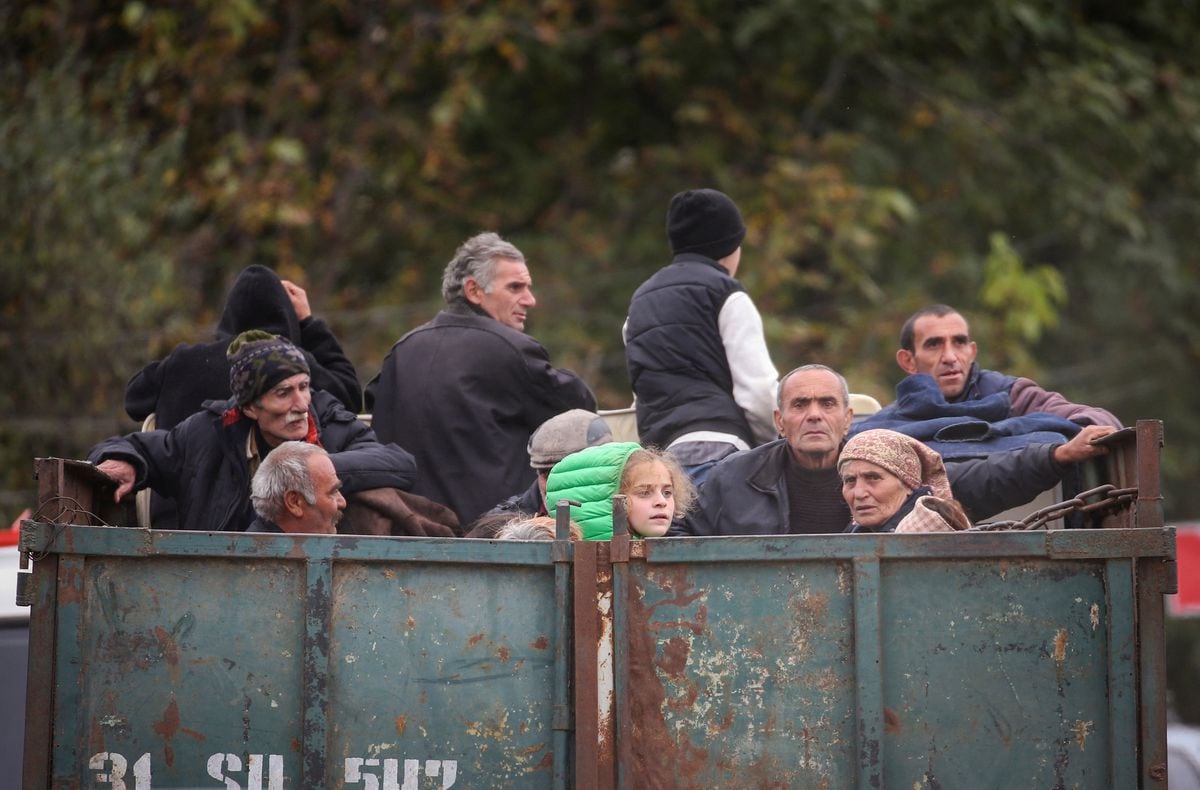
LONDON -- At least 68 people were killed and 105 are still missing from an explosion that tore through a makeshift gas station being used by ethnic Armenians on Monday night as thousands sought to flee the disputed enclave of Nagorno-Karabakh, according to local authorities.
The newly revised death toll followed a statement earlier from Armenia’s health minister, Anahit Avanesyan, saying 125 bodies from people killed in the blast had been brought to Armenia.
But Avanesyan later said those bodies were casualties from fighting. The Stepanakert Forensic Medical Examination Bureau in the enclave's regional capital said Tuesday the number of confirmed dead from the gas station blast remained at 68, with nearly 300 injured.
Many of the injured have been evacuated to Armenia, carried by Armenian and Russian military helicopters, local officials said. Avanesyan said most of the patients had extremely severe to severe injuries.
The explosion and fire ripped through the fuel store on Monday night as hundreds of refugees were lining up for gas for their vehicles to leave Nagorno-Karabakh, according to local officials.
Thousands of ethnic Armenians have been leaving the enclave following a successful military offensive last week by Azerbaijan that defeated the local Armenian authorities and restored Azerbaijan's rule over the region.

More than 28,000 people have crossed from Nagorno-Karabakh into Armenia since Sunday, according to a statement from Armenia's government. It's feared the enclave's entire population -- estimated at 120,000 -- may seek to flee in the coming days.
Armenia's prime minister on Monday said what was happening was the "ethnic cleansing" of Nagorno-Karabakh's Armenian population.
Long traffic jams of people seeking to leave were visible snaking miles along the only road out of Nagorno-Karabakh to a checkpoint in the "Lachin Corridor" that links the enclave to Armenia.
Nagorno-Karabakh has been at the center of a decadeslong conflict between Armenia and Azerbaijan. Internationally recognized as Azerbaijan's territory, the two countries fought a bloody war over the enclave amid the collapse of the Soviet Union, in which Armenia backed local ethnic Armenian separatists, who succeeded in establishing control over most of the region. Hundreds of thousands of Azerbaijani civilians were driven from the region during that war.
Azerbaijan reopened the conflict in 2020, launching a full-scale war that decisively defeated Armenia and forced it to largely abandon its claims to Nagorno-Karabakh. Russia helped broker a truce and dispatched a peacekeeping force there that remains deployed. Last week, Azerbaijan launched a new offensive that swiftly forced the Nagorno-Karabakh Armenian's leadership to surrender.

Since then thousands of ethnic Armenians have been preparing to leave the enclave, which has been under Azerbaijani blockade for nine months, unwilling to live under Azerbaijan's rule and fearing they will face persecution.
Western countries, including the United States, France and Germany, have expressed concern for Nagorno-Karabakh's Armenian population and warned Azerbaijan it bears responsibility for their rights and security.
The Biden administration has dispatched Samantha Power, currently administrator of USAID and senior another State Department official to Armenia to express U.S. support for the country amid the crisis.
Power on Tuesday visited the checkpoint at Armenia's border with Nagorno-Karabakh where refugees have been arriving, and called for international monitors and aid groups to be given access to the enclave and for Azerbaijan to facilitate the evacuation of injured civilians from there.
"It is absolutely critical that independent monitors as well as humanitarian organizations get access to the people in Nagorno-Karabakh who still have dire needs," Power told journalists at the checkpoint. "There are still tens of thousands of Ethnic Armenians there living in very vulnerable conditions," announcing the U.S. would provide $11.5 million in humanitarian assistance that would include everything from food to psychiatric support.

Power, who has been a high-profile campaigner for human rights, said she was in Armenia to also hear testimonies from people fleeing Nagorno-Karabakh and that she would be reporting back to the Biden Administration as it considers how to respond to the crisis.
Power and the Acting Assistant Secretary for Europe and Eurasian Affairs, Yuri Kim met with Armenia's prime minister Nikol Pashinyan on Monday. Power delivered a letter from President Joe Biden in which he expressed condolences for the loss of life in Nagorno-Karabakh and promised help on addressing humanitarian needs.
"I have asked Samantha Power, a key member of my cabinet, to personally convey to you the strong support of the United States and my Administration for Armenia's pursuit of a dignified and durable regional peace that maintains your sovereignty, independence, territorial integrity, and democracy," the letter read.

Pashinyan told Power the international community and Armenia had failed to prevent the "ethnic cleansing" of Nagorno-Karabakh's Armenians.
"Unfortunately, at the moment the process of the ethnic cleansing of Armenians in Nagorno-Karabakh is continuing, it is happening right now. It's a very tragic fact. We tried to inform the international community that this ethnic cleansing would happen, but, unfortunately, we did not manage to prevent it," Pashinyan told Power and Yuri Kim, the State Department's acting assistant secretary for Europe and Eurasian Affairs, according to the prime minister's press service.
Armenia and Azerbaijan were due to hold talks mediated by the European Union in Brussels on Tuesday, the first talks between the sides since Azerbaijan's retook Nagorno-Karabakh.

Monday's blast at the fuel station added a horrific complication to the exodus from Nagorno-Karabakh, with local authorities pleading for people to hold off leaving as the traffic-choking the roads out was preventing the evacuation of the severely injured.
Helicopters from Armenia's capital, Yerevan, were reported to have flown to Nagorno-Karabakh to help evacuate some of the worst injured. A long line of ambulances was also filmed by Russian media crossing into the enclave.
The enclave's Armenian health authorities said the hospitals in the enclave, already short of medicine and other equipment, were not equipped for the disaster.
Russia's peacekeeping contingent said it was also providing medical assistance and showed videos of its soldiers evacuating some of the injured.
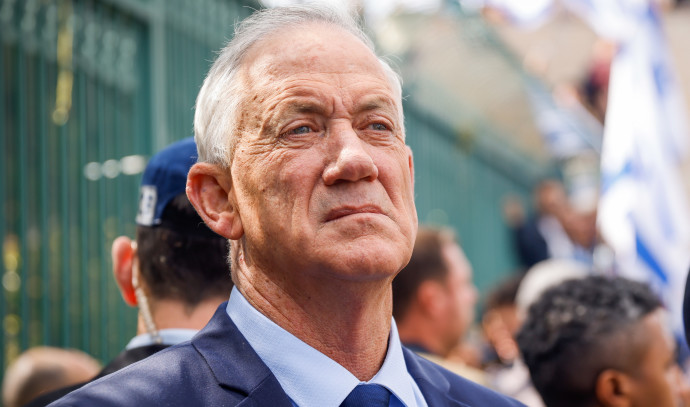


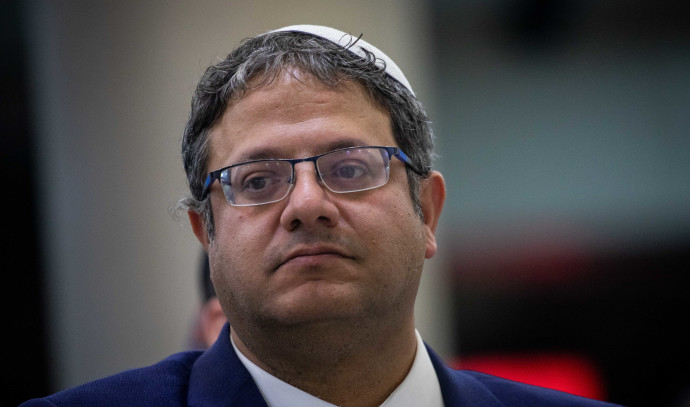


Comments
Post a Comment